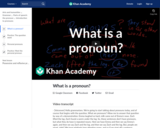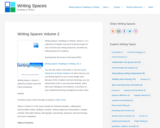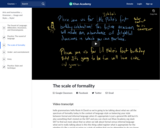
An introduction to how quotation marks are used in titles.
- Subject:
- English Language Arts
- Language, Grammar and Vocabulary
- Material Type:
- Lesson
- Provider:
- Khan Academy
- Provider Set:
- Khan Academy
- Author:
- David Rheinstrom
- Date Added:
- 07/29/2021

An introduction to how quotation marks are used in titles.

Pronouns are words that can replace nouns, like the way "it" replaces "elephant" in "I looked at the elephant. It was grey.".

A sentence is a grammatically complete idea. All sentences have a noun or pronoun component called the subject, and a verb part called the predicate. David and Paige explore this division across several different example sentences.

When do you use who, and when do you use whom? David, KA's grammarian, explains.

Following resource is a worksheet for identifying Nouns. I have taken the songs, stories and poems in public domain and have converted them into worksheets to teach students how to identify this part of speech in different contexts.Date of Creation: 29/10/2022Date of next revision: 30/10/2024

Volumes in Writing Spaces: Readings on Writing offer multiple perspectives on a wide-range of topics about writing. In each chapter, authors present their unique views, insights, and strategies for writing by addressing the undergraduate reader directly. Drawing on their own experiences, these teachers-as-writers invite students to join in the larger conversation about the craft of writing. Consequently, each essay functions as a standalone text that can easily complement other selected readings in writing or writing-intensive courses across the disciplines at any level.

The colon can separate parts of a title, citations of religious texts, and the hour and minutes in the time of day. Paige explains how!

These are the most regular of the irregular verbs; while they don't behave exactly like regular verbs, like present tense "walk" become past tense "walked", they do maintain the "-ed" sound. It's just spelled differently.

When you want to talk about the future in English, you use the future tense.

Some irregular verbs have these strange -en endings that only show up in their past perfect/past participle forms. Let's take a look!

The past tense refers to event that have happened in the past. The basic way to form the past tense in English is to take the present tense of the word and add the suffix -ed. For example, to turn the verb "walk" into the past tense, add -ed to form "walked." .

How do we talk about things that are happening right now?

How formal or informal should you be when you write or speak? Let's dive into that!

Some irregular verbs just won't be categorized. They don't fit into neat little boxes. These are those verbs.

This group of irregular verbs have vowel sounds that change in a predictable way, when they go from the present to the past tense.